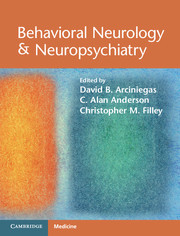Book contents
- Behavioral Neurology & Neuropsychiatry
- Behavioral Neurology & Neuropsychiatry
- Copyright page
- Contents
- Contributors
- Foreword
- Preface
- 1 Introduction
- Section I Structural and Functional Neuroanatomy
- Section II Neurobehavioral and Neuropsychiatric Assessment
- 20 Neuropsychiatricevaluation
- 21 Neurologicalexamination
- 22 Assessmentfor subtle neurological signs
- 23 Mental status examination
- 24 Neuropsychologicalassessment
- 25 Forensicassessment
- 26 Structuralneuroimaging
- 27 Advancedneuroimaging
- 28 Electroencephalography
- 29 Advancedelectrophysiology
- 30 Neurotoxicology
- 31 Neuropathologicalassessment
- Section III Treatments in Behavioral Neurology & Neuropsychiatry
- Index
25 - Forensicassessment
from Section II - Neurobehavioral and Neuropsychiatric Assessment
Published online by Cambridge University Press: 05 February 2013
- Behavioral Neurology & Neuropsychiatry
- Behavioral Neurology & Neuropsychiatry
- Copyright page
- Contents
- Contributors
- Foreword
- Preface
- 1 Introduction
- Section I Structural and Functional Neuroanatomy
- Section II Neurobehavioral and Neuropsychiatric Assessment
- 20 Neuropsychiatricevaluation
- 21 Neurologicalexamination
- 22 Assessmentfor subtle neurological signs
- 23 Mental status examination
- 24 Neuropsychologicalassessment
- 25 Forensicassessment
- 26 Structuralneuroimaging
- 27 Advancedneuroimaging
- 28 Electroencephalography
- 29 Advancedelectrophysiology
- 30 Neurotoxicology
- 31 Neuropathologicalassessment
- Section III Treatments in Behavioral Neurology & Neuropsychiatry
- Index
Summary
Keywords
- Type
- Chapter
- Information
- Behavioral Neurology & Neuropsychiatry , pp. 406 - 414Publisher: Cambridge University PressPrint publication year: 2013

